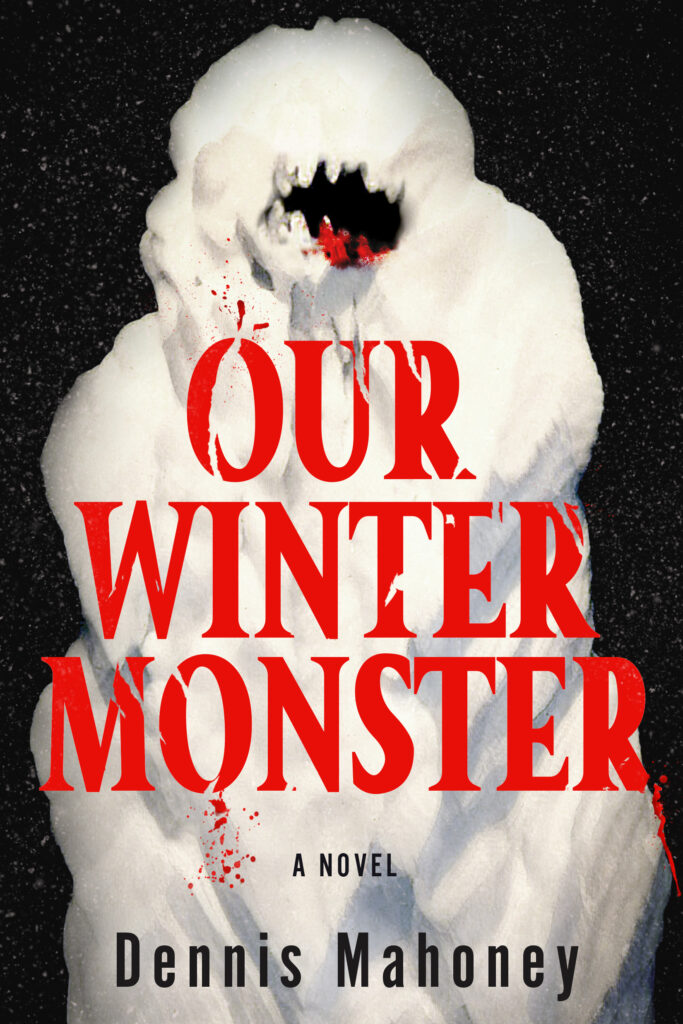Book Review: OUR WINTER MONSTER by Dennis Mahoney

I’ve got a soft spot for winter horrors, where the frigid environment compounds human or supernatural threats. Perhaps its the dose of familiarity I have with winter’s beauty and winter’s dangers that makes the setting work so well for me in fiction. Anyone else who likes such seasonal scares should check out Our Winter Monster by Dennis Mahoney, just published by Hell’s Hundred Books, a new horror imprint from independent publishers Soho Press. As the chilly winds and ice continue outside, there’s no better book to curl up with under a warm blanket and a warm beverage at hand. As much as I enjoyed the novel and would recommend it to particular readers, Our Winter Monster has several weaknesses combined with its many strong points. These add up to a solid thriller that will entertain many general readers and horror fans, but which fails to achieve a potency or quality that its premise or Mahoney show potential for. The summary provided by the publisher for Our Winter Monster does a great job of succinctly relating the plot: For the last year, Holly and Brian have been out of sync. Neither can forget what happened that one winter evening; neither can forgive what’s happened since. Tonight, Holly and Brian race toward Pinebuck, New York, trying to outrun a blizzard on their way to the ski village getaway they hope will save their relationship. But soon they lose control of the car—and then of themselves. Now Sheriff Kendra Book is getting calls about a couple in trouble—along with reports of a brutal and mysterious creature rampaging through town, leaving a trail of crushed cars, wrecked buildings, and mangled bodies in the snow. To Kendra, who lost another couple to the snow just seven weeks ago, the danger feels personal. But not as personal as it feels to Holly and Brian, who are starting to see the past, the present, and themselves in a monstrous new light . . . Let’s start with some of the things I think Mahoney does really well with Our Winter Monster. The wintry environment is like a character unto itself, manifested into a monster of swirling ice and snow that evokes fear. As the plot summary suggests, the exact nature of this monster is a mixture of supernatural and psychological, a metaphoric manifestation of trauma in Holly & Brian’s past that they are partially trying to work though, and partially trying to ignore/forget. Psychological horror manifesting in physical ways is nothing new to horror, but Mahoney pulls this off very well, blending past and present through the novel. Where Our Winter Monster could easily be written more towards the thriller or mystery end of the genre spectrum, Mahoney solidifies the horror aspect with frightening images of the snow monster, the psychological fear of characters not being able to control themselves, and the violence/gore of the deaths. Characterization is one aspect of the novel that has both successes and failures. Holly and Brian stand out with the most development (understandably as the protagonists.) As the reader discovers more of their past and what is to come during this present night of trial, one can see a great arc in each of them as individuals as well as the two of them as a couple who love one another. Mahoney integrates these characters very well with the plot to show how their difficulties of relating to one another stem from the trauma that make them unsure of each of them, themselves. They have to learn how to face themselves and the individual decisions of their past. Yet, they find the strength to do this together. As the thematic core of Our Winter Monster, Mahoney does a phenomenal job in these characters and how they drive the plot. However, the secondary characters don’t come off as well. The amount that Kendra is in the novel necessitates deeper development then ends up being there. It seems as if her story should intersect in ways with Holly & Brian’s, yet I didn’t finish the novel with any sense of this being the case. Likewise, another secondary character, Tanner, could have been more fully developed, given how central he ends up being to the plot. I felt this particularly so because his role ended up feeling very predictable, even from his first appearance on the pages. Beyond being a horror novel through the story of Holly & Brian, Mahoney seems to be adding a mystery novel with the secondary characters, and this half just doesn’t have the same heart, resonance, or novelty to it. The other significant critique I would make of Our Winter Monster is that Mahoney tends toward fully explaining things to readers rather than letting ambiguity or subtlety rule. For an undemanding reader just looking for some entertaining diversion without having to invest too much focus, this approach will work on point. But an approach toward the other end of the spectrum would have helped make the novel into something more special. As I write this, I’m realizing Our Winter Monster is an interesting novel that straddles the line between mass market thriller for casual readers and psychological/supernatural horror novel for fans who are familiar with the genre tropes. By casting this bimodal net Mahoney’s book would probably capture the interest and admiration of both kind of readers while also leading to disappointing some from each camp. Perhaps because I’m fine with switching between the two branches of reading, even within a single work, the novel ended up scoring overall with me. Beyond this, I’m very interested in seeing what else Hell’s Hundred releases in the future.
Book Review: MJ-12: Endgame by Mike Martinez

The MJ-12 series (MJ-12 Inception, MJ-12: Shadows) comes to a successful conclusion in Mike Martinez’s MJ-12 Endgame, where a plot by Lavrentiy Beria to take control of the Soviet Union after Stalin’s death will help decide the fate of Variants across the world. MJ-12: Endgame does not waste any time in dropping us into the world of Mike Martinez’s MJ-12 ‘verse, an alternate world where people given superpowers by two mysterious vortexes at the end of the second World War are recruited into the intelligence agencies of the USA and the USSR to covertly thwart the plots and plans of the other side.
Guest Post: Finding the Dark by Rachel Caine

Today on Skiffy and Fanty, Rachel Caine, part of the Dead Air team, a podcast/serial story collaboration she is doing with Gwenda Bond and Carrie Ryan, tells us about finding the darknes in thrillers and what her new project has to offer. I started reading my dad’s books when I was, well, old enough to figure out where he kept them, which was way too young. Some of them were what would be euphemistically called “men’s adventure” today; James Bond-type books, only with more sex and violence. Some were horror. But I most remember the opening of one of Ed McBain’s 87th Precinct novels … a book about a murderer backing a woman into a corner in her apartment, and relentlessly slashing back and forth at her like a sideways pendulum. It haunted me. I couldn’t get it out of my head, no matter how much fun space exploration science fiction I read, or high fantasy, or historical novels (all of which I loved).
My Superpower: Michael R. Underwood, 2nd edition

My Superpower is a regular guest column on the Skiffy and Fanty blog where authors and creators tell us about one weird skill, neat trick, highly specialized cybernetic upgrade, or other superpower they have, and how it helped (or hindered!) their creative process as they built their project. Today we welcome our own Michael R. Underwood (aka Mike) back to talk about how the power of being a role-playing gamer applies to his novel The Younger Gods.
My Superpower: Geoffrey Girard

My Superpower is a regular guest column on the Skiffy and Fanty blog where authors and creators tell us about one weird skill, neat trick, highly specialized cybernetic upgrade, or other superpower they have, and how it helped (or hindered!) their creative process as they built their project. Today we welcome Geoffrey Girard to talk about how his Supreme Strategic Suspicions relate to Cain’s Blood… In Cain’s Blood, the teenaged clones of infamous serial killers (Bundy, Gacy, Berokowitz, Dahmer, etc.) cause all sorts of nasty havoc. I was somewhat puzzled by early reviews that focused on how “dark and violent” the book is. I’d never really thought about that. I just wrote about what might happen next, the most-likely thing in a given situation. When Scott Smith, the author of The Ruins, called the book “very dark,” I didn’t think much of that either, until I watched The Ruins for the first time in years and thought: “THIS guy thinks I’m dark!” It was the first time I stopped to consider what I’d ultimately created. And How.

